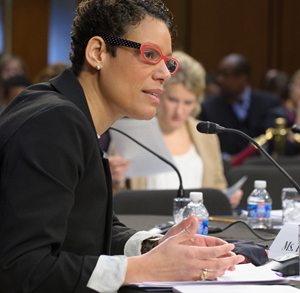SSW’s Taylor Testifies before U.S. Senate HELP Committee
The work of the University of Maryland School of Social Work (SSW) gained attention on Capitol Hill as Henriette Taylor, MSW, LGSW, testified Feb. 3 on innovative ways that the SSW helps schoolchildren thrive through its Promise Heights and Community Schools programs.
Taylor, a Promise Heights staff member who is the community school coordinator at The Historic Samuel Coleridge-Taylor (HSCT) Elementary School in Baltimore, appeared before the U.S. Senate Health, Education Labor & Pensions (HELP) Committee as Congress considers ways to best update the federal education act. She was joined by Sen. Barbara A. Mikulski, MSW '65, who was among the committee members participating in a roundtable discussion: “Fixing No Child Left Behind: Innovation to Better Meet the Needs of Students.” View a photo gallery.

Henriette Taylor, courtesy Senate Photographic Services
Taylor informed the senators of the need for real-time student data to better provide wraparound services for children so that problems do not hamper academics. In a written statement and her remarks, she shared observations drawn from her experiences at HSCT as a licensed social worker with the SSW's Promise Heights program in Upton/Druid Heights. In this West Baltimore community only a mile from the University of Maryland, Baltimore campus, the university’s professional schools, government and private partners are collaborating to serve five public schools through the SSW-led program.
Mikulski told the roundtable that she knows the neighborhood well and, speaking as a social worker, can attest to its burden of poverty and crime that demands wraparound services. Mikulski was awarded the Dean's Medal for Distinguished Service, the UM SSW's highest honor, in 2012, which was the same year that the senator from Baltimore became the longest serving woman in the history of the U.S. Congress.
The HELP committee invited Taylor and six others from around the nation to interact with its members on topics that ranged from testing to making decisions on what constitutes success or failure. Sen. Lamar Alexander of Tennessee, the committee chairman, explained that the roundtable was a somewhat informal format to encourage a lively conversation among the members and witnesses. The discussion is available on the committee’s video archive along with other sessions leading up to reauthorization of the Elementary and Secondary Education Act.
Taylor was one of two witnesses who represented communities served through funding by the U.S. Department of Education Promise Neighborhoods, a model that she and an official of Delta Health Alliance, Stoneville, Miss., described as a good fit whether schools are urban or rural. She also advocated for the national Community Schools model, saying that as a coordinator she brings in $4 for every $1 in funding through partnerships.
The SSW, through its Social Work Community Outreach Service, also has Community Schools partnerships in Baltimore that, like the one at HSCT, are supported by the Family League of Baltimore. It was through the Family League that Taylor was contacted to appear as a witness after the HELP Committee approached the Institute for Educational Leadership, which houses the Coalition for Community Schools.



